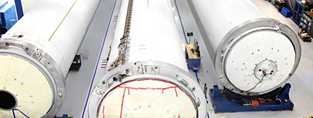
- (03) 5909 8218
- enquiry@fusionweld.com.au
Different Types of Fuel Storage Systems
January 28, 2016

Fuel demands are the single biggest concern on our small globe. Petrol, gasoline to our American visitors, storage vessels are situated underground in every major street in every city, with each container pumping enough hydrocarbon-based life blood to keep 1.2 Billion cars on the move. Gas and liquid petroleum reservoirs pool the rest of our fuels into vast fuel storage systems that fill either overland or subterranean containment facilities. And let's not forget the biofuels and renewable energy sources that are currently on the horizon, for they are destined to be the new rising stars as fossil fuels come to their inevitable end.
Ethanol Storage
On questioning the function of the storage unit, its base design classes the product as suitable for its role in the field. Ethanol systems, for example, employ a series of blend labels. This fuel mixture standardization guide instructs vessel designers on what materials to avoid and what filters to install. If you're not aware of this fuel source, ethanol is derived from corn, sugar, and other farmed sources.
The Above Ground or Subterranean Question
It's a classic engineering question, the choice to fit fuel storage systems on the surface or several metres below ground. The above ground option invokes the use of a metal infrastructure and the associated climbing aids that arise as a result of installing vessels above the ground. Conversely, an entirely different set of guidelines rules the below-ground environment. The soil possesses alkaline or acidic properties, meaning some form of corrosion protection has to be installed.
Specific Examples for Fuel Storage Systems
Double-walled vessels cope with the briny air of a marina while filling the fuel tank of a ship. Aviation fuel is kept in zinc-free and copper-free vessels, with all system fittings avoiding these and other reactant metals. The highly combustible energy source is kept contaminant-free within expertly welded vessels, reinforced tanks that sport ballistic-proof extras. Next comes the utilitarian services of boiler fuel tanks and vessels that supply the fluid energy for electric generators. Such storage assemblies usually adopt a more decentralized appearance, with pipes penetrating thick walls so as to isolate the flammable material from the flame of the boiler and the spark of the generator.
Different storage solutions impact the design of the vessel and its associated pipes and valves. The stored gas or liquid comes in at a set pressure or exhibits caustic properties, negating certain alloys. Meanwhile, weathering influences and the decision to adopt either an above ground or underground configuration will have every bit as much of an effect on the system as the contained gas or liquid.
Contact Details
Fusion - Weld Engineering Pty Ltd
ABN 98 068 987619
1865 Frankston Flinders Road,
Hastings, VIC 3915
Ph: (03) 5909 8218
Optimized by NetwizardSEO.com.au
Recent Posts
- Process Skid Fabrication Melbourne: Modular Plant Solutions for 2026 Projects
- Pressure Vessel Inspection: Ensuring Peak Efficiency in 2026 Oil & Gas Operations
- Pressure Vessel Fabrication: Engineering Efficiency for 2026 Petrochemical Projects
- Heat Exchanger Maintenance in Melbourne: Minimising Risk in Power Generation Facilities
- Compressed Hydrogen Storage Vessels: Material Selection, Design & Australian Standards
- Welding QA/QC in Oil & Gas Pressure Vessel Fabrication – Ensuring Code Compliance
- AS1210 vs ASME VIII Pressure Vessel Code: Key Differences for Australian Projects
- Mitigating Hydrogen-Induced Cracking in Pressure Vessels: Engineering and Material Strategies
- Storage Tank Solutions Australia: Field-Erected, Prefabricated & Self-Bunded Explained
- Reducing Environmental Risks: Self-Bunded Tanks in Australian Oil & Gas Operations
- Precision in Production: How Pressure Vessels Are Manufactured for Industrial Safety
- Shell & Tube Heat Exchangers: Improve Thermal Control & Energy Recovery in Petrochemical & Pharmaceutical Plants
Posts 2026
- Process Skid Fabrication Melbourne: Modular Plant Solutions for 2026 Projects
- Pressure Vessel Inspection: Ensuring Peak Efficiency in 2026 Oil & Gas Operations
- Pressure Vessel Fabrication: Engineering Efficiency for 2026 Petrochemical Projects
- View all articles…
Posts 2025
- Compressed Hydrogen Storage Vessels: Material Selection, Design & Australian Standards
- Welding QA/QC in Oil & Gas Pressure Vessel Fabrication – Ensuring Code Compliance
- View all articles…
Posts 2024
- Large Process Vessels: Optimising the Design for Maximum Efficiency [2025]
- Pressure Equipment Management System Installation: Detect Equipment Faults Early
- View all articles…
Posts 2023
- Pressure Piping System Inspection: A Gift of Safety for the Holidays
- Deaerator Inspections by Fusion-Weld Engineering and How They Reduce System Downtime
- View all articles…
Posts 2022
- How Fusion Weld Keeps Up With AS-NZS ISO 9001:2008 Standard
- Boiler Equipment Safety Inspection During the Summer Season
- View all articles…
Posts 2021
- Avoid These Factors and Practices that Contribute to Sealing Damage in Pressure Vessels
- Do's And Don'ts Of Industrial Boiler Inspection And Maintenance From Fusion-Weld
- View all articles…
Posts 2020
- What are the Risks and Hazards Involved in Pressure Vessel Equipment?
- How to Know if Your Pressure Equipment Needs Repair or Replacement?
- View all articles…
Posts 2019
- Factors that Contribute to Pressure Vessel Failure
- Pressure Vessel Regulations in Australia: What are the Mandatory Requirements?
- View all articles…
Posts 2018
- Pros and Cons of Spherical vs. Cylindrical Pressure Vessels
- What are the Different Hazard Levels in Pressure Vessels?
- View all articles…
Posts 2017
- Transportable Pressure Vessels: The Importance of Inspection and Safety Checks
- Fracture Mechanics and Stress Analysis of Cracks in Pressure Vessels
- View all articles…
Posts 2016
Posts 2015
- What Are Deaerators & Feedwater Vessels?
- Precautions and Safety for Compressed Air Receiver Vessels
- View all articles…
Posts 2014
- Demonstrating In-process Inspection Procedures
- Static Grounding Practices and Standards
- View all articles…